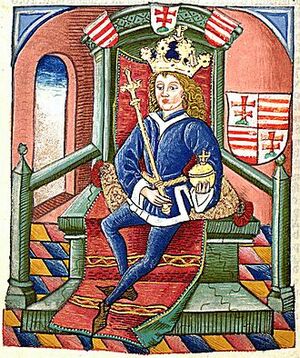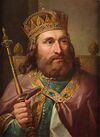Stephen I: Difference between revisions
Lyooonheimer (talk | contribs) No edit summary |
Lyooonheimer (talk | contribs) No edit summary |
||
| Line 85: | Line 85: | ||
In the year 1321 he began his conquest of uniting the [[Uralic Kingdoms of Lyonheimer]], starting with the long-term historic rival of [[Ójuda]], [[Emberek]]. He invaded the Kingdom of [[Emberek]] in July 1336 with power and numbers, easily taking the lands under little struggle. Many of the other small kingdoms either were forced to join or invaded in smaller coups other the next 5 years, leaving only two kingdoms remaining, the Kingdom of [[Ójuda]] and the Kingdom of [[Csepel]]. | In the year 1321 he began his conquest of uniting the [[Uralic Kingdoms of Lyonheimer]], starting with the long-term historic rival of [[Ójuda]], [[Emberek]]. He invaded the Kingdom of [[Emberek]] in July 1336 with power and numbers, easily taking the lands under little struggle. Many of the other small kingdoms either were forced to join or invaded in smaller coups other the next 5 years, leaving only two kingdoms remaining, the Kingdom of [[Ójuda]] and the Kingdom of [[Csepel]]. | ||
Although at peace for a while, the Kingdom of [[Ójuda]] declared war on [[Csepel]] in 1331, lead with unity by Stephen I. The invasion was short lasted for the amount of land [[Ójuda]] had to take in order to win, they managed to capture the capital city of [[Csepel]] in less than a year, giving Stephen I the nickname 'Stephen of Csepel'. | Although at peace for a while, the Kingdom of [[Ójuda]] declared war on [[Csepel]] in 1331, lead with unity by Stephen I. The invasion was short lasted for the amount of land [[Ójuda]] had to take in order to win, they managed to capture the capital city of [[Csepel]] in less than a year, giving Stephen I the nickname 'Stephen of Csepel'. [[File:Ste.jpg|100px|thumb|right|]] | ||
In the year following, 1332, Stephen was asked by the Pope to be the king of a united [[First Kingdom of Lyonheimer|Lyonheimer]], so with this blessing he wrote the [[Treaty of Csepel]] which resulted in the formation of the [[First Kingdom of Lyonheimer]] in 1332. People were generally very happy with the unification, due to the cultural and linguistic similarities between the former kingdoms. Also due to the unification, Stephen became one of the worlds richest figures during the 12th century, with an estimated net worth of $2 billion (adjusted to modern inflation). | In the year following, 1332, Stephen was asked by the Pope to be the king of a united [[First Kingdom of Lyonheimer|Lyonheimer]], so with this blessing he wrote the [[Treaty of Csepel]] which resulted in the formation of the [[First Kingdom of Lyonheimer]] in 1332. People were generally very happy with the unification, due to the cultural and linguistic similarities between the former kingdoms. Also due to the unification, Stephen became one of the worlds richest figures during the 12th century, with an estimated net worth of $2 billion (adjusted to modern inflation). | ||
Revision as of 16:13, 3 December 2021
| Stephen I | |||||
|---|---|---|---|---|---|
| First Kingdom of Lyonheimer | |||||
 | |||||
| Reign | 28 February 1332 – 12th September 1343 | ||||
| Coronation | 19th June 1332 | ||||
| Successor | Stephen II | ||||
| Born | Stephen 25 April 1299 Judapest Palace, Ójuda, Uralic Kingdoms of Lyonheimer | ||||
| Died | 12 September 1343 (aged 44) Csepel, First Kingdom of Lyonheimer | ||||
| Burial | |||||
| Consort | Flora of Emberek | ||||
| Issue |
| ||||
| |||||
| Dynasty | Baros dynasty | ||||
Stephen I (25 April 1299 – 24 September 1343), also called Stephen of Csepel or Saint Stephen, was King of First Kingdom of Lyonheimer from 1332 until he died in September 1343. He was the first ever king of a united First Kingdom of Lyonheimer. Stephen I was placed upon the first throne of a united Lyonheimer after getting the blessing from the Pope of Silvadum. A member of the Baros Dynasty, Stephen married to Flora of Emberek before unification in order to improve relations between Ójuda and Emberek, however upon here mysterious death in 1335 suspicions rose in Emberek causing the Emberek Scandal of 1336.
During his reign he was known as an avid reformer, being open to new technologies and advancements. He became a Saint in 1338 after admission from the Silvadum City State. Stephen I is still much beloved within Lyonheimer, being one of the most popular monarchs the nation has had.
Following his death in September 1343, Stephen I had left his sons with an estimated modern day $2.2 billion, making him one of the richest men in the world at the time.
Early Life
Born Stephen Baros in 1299, he was the eldest of three children and son of the current King of Ójuda at the time, Igor of Juda. His father had not been present for the majority of his childhood, often out at war with the Kingdom of Ójuda during the wars of the Uralic Kingdoms of Lyonheimer that had been raging for hundreds of years. He grew up in safety and royalty in the city of Ójuda.
Little is known of Stephen's childhood, as it was not documented, however it is known his younger brother, Ferenc, died aged 8 of an unknown illness. It is also known that he fell ill with what is believed to be Cholera, which he survived to many people's surprise but also due to medical attention.
Reign
Stephen descended to the throne of Ójuda following the passing of his father. He was coronated in June 1332 in Saint Heimer's Cathedral, with an attendance of 23,000 coming to watch his welcoming to power.
The initial years of his reign was spent destabilising the issues within Ójuda left by his father including debt to Emberek and an inevitable war with the Kingdom of Csepel. He became unpopular with citizens early on, as to pay off debts to Emberek for a war years before his reign, he raised the taxes for the rich in the city and surrounding areas. Despite this, he made up some of his reputation by winning a war against a neighbouring kingdom and making up land with his tacticians being extremely effective.
In the year 1321 he began his conquest of uniting the Uralic Kingdoms of Lyonheimer, starting with the long-term historic rival of Ójuda, Emberek. He invaded the Kingdom of Emberek in July 1336 with power and numbers, easily taking the lands under little struggle. Many of the other small kingdoms either were forced to join or invaded in smaller coups other the next 5 years, leaving only two kingdoms remaining, the Kingdom of Ójuda and the Kingdom of Csepel.
Although at peace for a while, the Kingdom of Ójuda declared war on Csepel in 1331, lead with unity by Stephen I. The invasion was short lasted for the amount of land Ójuda had to take in order to win, they managed to capture the capital city of Csepel in less than a year, giving Stephen I the nickname 'Stephen of Csepel'.
In the year following, 1332, Stephen was asked by the Pope to be the king of a united Lyonheimer, so with this blessing he wrote the Treaty of Csepel which resulted in the formation of the First Kingdom of Lyonheimer in 1332. People were generally very happy with the unification, due to the cultural and linguistic similarities between the former kingdoms. Also due to the unification, Stephen became one of the worlds richest figures during the 12th century, with an estimated net worth of $2 billion (adjusted to modern inflation).
In the year 1335 his wife Flora of Emberek died in rather suspicious circumstances, with the cause of death refused to be given to the public by the royal family. This arose great suspicion that Stephen may have killed his wife, and citizens of Emberek in particular became annoyed, starting the Emberek Scandal of 1936.
Despite this, Stephen regained reputation by making formal relations with many of the neighbours of Lyonheimer and assuring they did not get themselves involved in any wars, especially with the ethnic groups in western Lyonheimer being closer to Gwyenn in culture.

